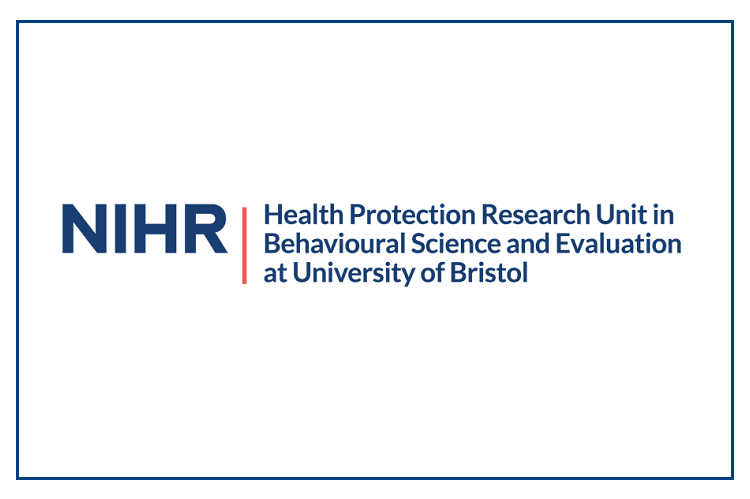1 April 2020
We are re-launching our National Institute for Health Research (NIHR) funded Health Protection Research Unit (HPRU) today (1 April) with a new focus and identity. From today, we will be known as the NIHR Health Protection Research Unit in Behavioural Science and Evaluation at University of Bristol (formerly NIHR HPRU in Evaluation of Interventions). This change reflects our expanded scope to use insights into health behaviour in the design, evaluation and implementation of public health interventions.

It follows an award of £4M from NIHR as part of a £58.7 million investment to protect the health of the nation announced earlier this year. The NIHR is the nation’s largest funder of health and care.
The NIHR HPRU in Behavioural Science and Evaluation (HPRU in BSE) is one of 14 HPRUs across England, and is a partnership between Public Health England (PHE) and University of Bristol, in collaboration with the MRC Biostatistics Unit at the University of Cambridge and University of the West of England.
HPRUs undertake high quality research that enhances the ability of PHE to use innovative techniques to protect the public’s health and minimise the health impact of emergencies.
All the new HPRUs will have an additional focus on collaboration and knowledge sharing and will play a pivotal role in maintaining and growing PHE’s scientific expertise and future workforce.
The new units will also deliver responsive research to tackle emerging or potential public health emergencies and are closely involved in PHE’s response to the current COVID-19 pandemic.
Our new HPRU will build on the successes of the last five years. Since our launch in 2014, we have contributed to 350 peer review publications, and generated £20 million in additional research income. Above all, our research has had a real impact on people’s health.
Professor Matthew Hickman, Professor in Public Health and Epidemiology – Deputy Head of School and Head of Bristol Medical School (PHS), said: “We are delighted that funding for our work developing and evaluating effective and cost-effective interventions to protect the public’s health will continue for the next five years. Together with partners, we will co-design a programme of research to support Public Health England tackle some of the biggest health threats nationally and globally. We look forward to continuing our previous successful partnership and expanding our research capacity in behavioural science.”
Professor Isabel Oliver, Director of Field Epidemiology for Public Health England and a Visiting Professor at Bristol’s Medical School, said: “Our work in partnership with the University of Bristol will ensure that Public Health England remains at the cutting edge of applied health protection research and it will help us deliver the objectives set out in PHE’s new five-year strategic plan, and its ambitious Infectious Disease Strategy. We are looking forward to continuing to work with our colleagues at the University of Bristol, and with other partners from across the HPRU programme.”
Professor Richard Amlôt, Scientific Programme Leader of the Behavioural Science Team based in the Emergency Response Department at PHE. “The renewed focus on the application of behavioural and social science to health protection is a welcome and timely addition to the new HPRU. In its new Five-Year Strategy, Public Health England seeks to optimise how we use behavioural science to tackle a range of public health challenges. The work of the new HPRU in Behavioural Science and Evaluation provides an excellent opportunity to realise this ambition.”
New contact details
We have a new web address: www.hprubse.nihr.ac.uk. Our new Twitter handle is @HPRU_BSE. If you follow us on Twitter, you don’t need to do anything as you are still a follower after the name change. Our new contact email address is admin-hprubse@bristol.ac.uk.
Further information
About the NIHR
The National Institute for Health Research (NIHR) is the nation’s largest funder of health and care research. The NIHR:
- funds, supports and delivers high quality research that benefits the NHS, public health and social care
- engages and involves patients, carers and the public in order to improve the reach, quality and impact of research
- attracts, trains and supports the best researchers to tackle the complex health and care challenges of the future
- invests in world-class infrastructure and a skilled delivery workforce to translate discoveries into improved treatments and services
- partners with other public funders, charities and industry to maximise the value of research to patients and the economy.
The NIHR was established in 2006 to improve the health and wealth of the nation through research, and is funded by the Department of Health and Social Care. In addition to its national role, the NIHR supports applied health research for the direct and primary benefit of people in low- and middle-income countries, using UK aid from the UK government.